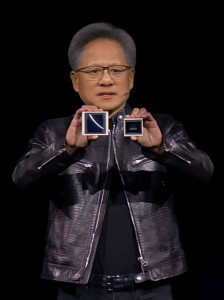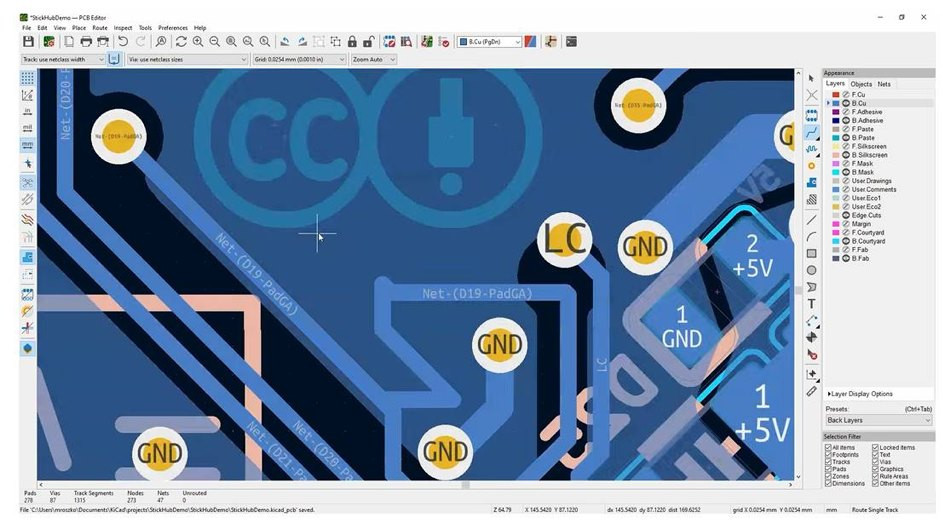The CES and HMI are over and have carried their message out into the world. Robotics and artificial intelligence will define the next decade. So far so good.
 CA Jensen Huang, CEO NVIDIA, keynote on March 18, 2024 at GTC 2024 in San JoséOnthe sidelines of the trend-setting electronics trade fairs, the CEO of NVIDIA almost casually brought a game changer into play at the GTC AI Conference 2024 in San José, which should not only make the software world stop. AI/AI will make programmers (software specialists) unnecessary in the future. Of course, NVIDIA's hardware will play an important role. The more powerful it becomes, the more powerful AI/AI will be able to generate program codes. The signal was/is: you won't need to learn programming in the future. Neither at school, nor at university, etc. If this is the case, then a huge army of qualified specialists will either be freely available for the skilled labor market in other areas or simply superfluous.
CA Jensen Huang, CEO NVIDIA, keynote on March 18, 2024 at GTC 2024 in San JoséOnthe sidelines of the trend-setting electronics trade fairs, the CEO of NVIDIA almost casually brought a game changer into play at the GTC AI Conference 2024 in San José, which should not only make the software world stop. AI/AI will make programmers (software specialists) unnecessary in the future. Of course, NVIDIA's hardware will play an important role. The more powerful it becomes, the more powerful AI/AI will be able to generate program codes. The signal was/is: you won't need to learn programming in the future. Neither at school, nor at university, etc. If this is the case, then a huge army of qualified specialists will either be freely available for the skilled labor market in other areas or simply superfluous.
"You can also look at it this way"
It should be considered whether this might also apply to other areas of electronics development or whether it will expand.
I am thinking here, for example, of the developer of electronic circuits and also of layouters, PCB or printed circuit board designers.
Will the role of the layout designer be different in the future?
In the past, there have been repeated attempts to automate the layout process in particular. Nevertheless, there are still very many layouters/designers. And rightly so: the previous layout systems and autorouters were not good enough, not fast enough, not error-free enough. This will still be the case in 2024, as the example of KiCad's 'Interactive Router' shows. KiCad may forgive me for choosing them as an example here. However, it was also presented very prominently on KiCad's own website. Figure 1 shows a screenshot from the KiCad presentation video with the error in question - a critical detail for production. You should watch the video and follow 'live' how the interactive router lays the track and makes a small mistake in the process. An experienced layouter would never allow this to happen. Experience is a valuable asset in this profession!
 Fig. 1: Screenshot KiCad presentation video
Fig. 1: Screenshot KiCad presentation video
Will this change soon?
When I first became familiar with layout systems during my apprenticeship in the early 1990s, great hopes were placed in the new autorouters. You started the router and let the computer (386 or a UNIX machine) run all day and all night in the hope of getting a 100% finished routed circuit board. You know the result: it was by no means the case. Back then, people worked with so-called 'expert systems'. These were the AI/AI systems of that time.
More than 30 years have passed since then. Today, the profession of layout designer is still held in high regard because it is necessary and needed.
Will the massive introduction of AI change this?
I think so. The question is how quickly this change will happen. And will it radically change a current profession?
It's not just the job description of a programmer that is changing. The tasks and scope of work for layout designers will also change radically in the future. New layout systems will emerge that use more and more of the latest AI-based development technologies. A key point will be that people will also think and develop in the third dimension when thinking and conceptualizing a product and a design. The merging of E-CAD and M-CAD into a common 3D CAD world is a significant factor here.
You can also look at it this way
Best regards
Jan Kostelnik
www.tebko.de
Sources
[1] GTC AI Conference 2024, March 21-23, 2024 at the San Jose Convention Center, www.nvidia.com/gtc/sessions/ (Retrieved: April 16, 2024).
[2] www.kicad.org/discover/3dviewer/ (accessed: April 16, 2024).
[3] www.youtube.com/watch?v=Y2F8yisiS6E (Retrieved: April 16, 2024[1]).


